As the National People’s Congress, the country’s top legislature, opens its annual session on March 5, here is a selection of ministers’ comments on important policies from the famous “ministers’ passage” at the two sessions — the annual meetings of the National People’s Congress (NPC) and the Chinese People’s Political Consultative Conference (CPPCC) National Committee.
The “ministers’ passage”, also known as “the ministers’ red carpet”, is the 100-meter passage near the northern gate of the Great Hall of the People where ministers and other high-ranking officials must walk through before entering the meeting hall.
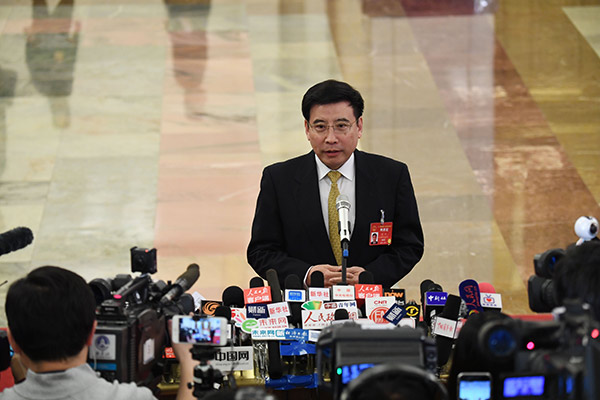
Minister of Industry and Information Technology Miao Wei talks to media at “ministers’ passage” in Beijing, March 5, 2017.[Photo/Xinhua]
Govt will not tolerate ‘subsidy cheating’ by new energy vehicles
China has zero tolerance for “subsidy cheating” by some new energy vehicle makers and the country will introduce new policies as the subsidies will be phased out by 2020, Minister of Industry and Information Technology Miao Wei said on March 5.
Miao said the government will improve the existing policies and strengthen the regulation on subsidies offered to carmakers.
The minister made the comments before the opening of the annual meeting of the National People’s Congress, the country’s top legislature.
Miao said the government is also studying alternative policies as the government will end the subsidy policy in 2020.
“We are planning to set up a new trading system based on the energy consumption of the traditional and the new energy vehicles,” Miao said, adding the ministry is soliciting public opinions on its website.
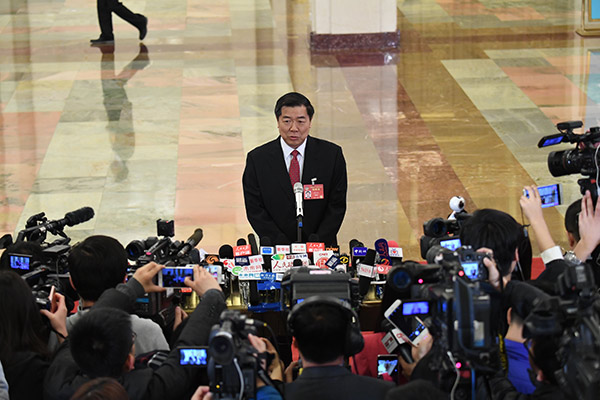
Minister of the National Development and Reform Commission He Lifeng talks to media at “ministers’ passage” in Beijing, March 5, 2017. [Photo/Xinhua]
China’s growth steady, healthy
China witnessed steady and healthy economic growth last year, the nation’s top economic planner said on March 5.
He Lifeng, minister of the National Development and Reform Commission, said “it wasn’t easy” to achieve the forecast 6.7 percent growth rate, given the external uncertainties and economic downward pressure seen in 2016.
But within the context of the last year’s situation, the expected 6.7 percent growth rate would be healthy, he said.
He made the remarks ahead of the opening of the annual meeting of the National People’s Congress, the country’s top legislature.
Chinese economic growth accounted for 33 percent of global economic growth last year, according to He.
He also cited data that China created more than 10 million jobs and lifted more than 12 million people out of poverty last year.
China’s GDP in 2015 reached 67.7 trillion yuan, up 6.9 percent year-on-year.
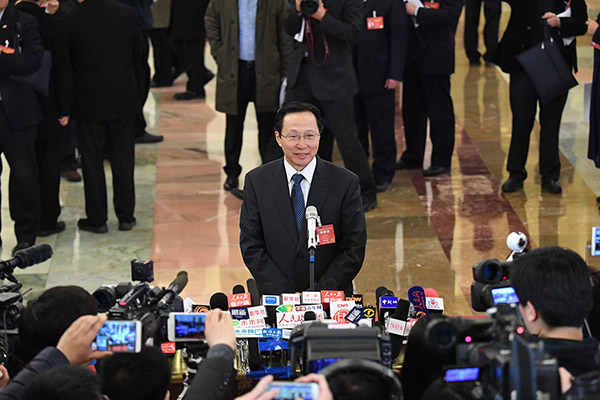
Agriculture Minister Han Changfu, talks to media at “ministers’ passage” in Beijing, March 5, 2017.[Photo/Xinhua]
Dairy sector scales new heights
The dairy sector has reached new heights with the development of large-scale farms and use of machinery after the 2008 milk scandal, Agriculture Minister Han Changfu said on March 5.
The minister told reporters before the opening of the annual National People’s Congress that large-scale dairy farms now account for 50 percent of the milk supply in the dairy sector, and use of machinery is commonplace.
Sales and production of the top 20 milk enterprises now takes up half of the whole sector, he said.
“All those changes are indicators that China’s dairy sector is heading for rejuvenation,” he said.
The dairy sector was hit hard after a 2008 scandal in which a number of farmers and manufacturers were found to have added melamine, a toxic chemical, to unprocessed milk.
Han said the authority will continue to step up the regulation on milk sources and the raising of dairy herds, and encourage the development of large-scale enterprises and name brands in the sector.
“I believe that someday foreign tourists will purchase Chinese milk powder when they visit China,” he said.
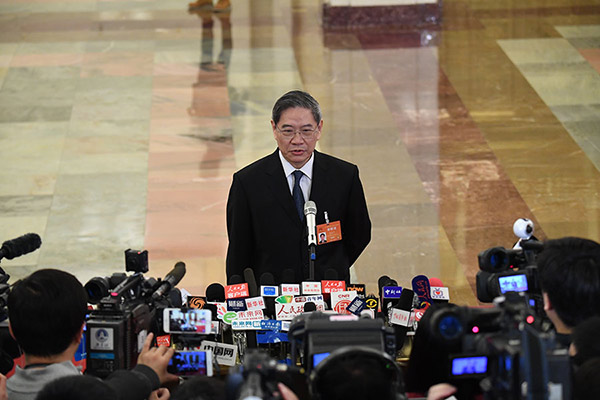
Zhang Zhijun, head of the Taiwan Affairs Office of the State Council, talks to media at “ministers’ passage” in Beijing, March 5, 2017.[Photo/Xinhua]
Policy toward Taiwan remains unchanged
The policy of the Chinese mainland toward Taiwan will remain unchanged in 2017 despite a possible increase in uncertain factors and challenges in cross-Straits relations, the mainland’s Taiwan affairs chief said on March 5.
Zhang Zhijun, head of the Taiwan Affairs Office of the State Council, told reporters before the opening of the annual session of the National People’s Congress that cross-Straits relations faced more complicated and severe challenges this year.
“However, our policies toward Taiwan will not change because of the change in the political situation in Taiwan,” he said.
Zhang said the Chinese mainland will resolutely uphold the one-China principle and oppose “Taiwan independence”, and safeguard the peace and stability in cross-Straits ties.
The Chinese mainland will also promote cross-Straits exchanges and more coordinated social and economic development across the Straits.
Since the Democratic Progressive Party took over leadership in Taiwan in May 2016, cross-Straits relations have worsened and official communication has been suspended.
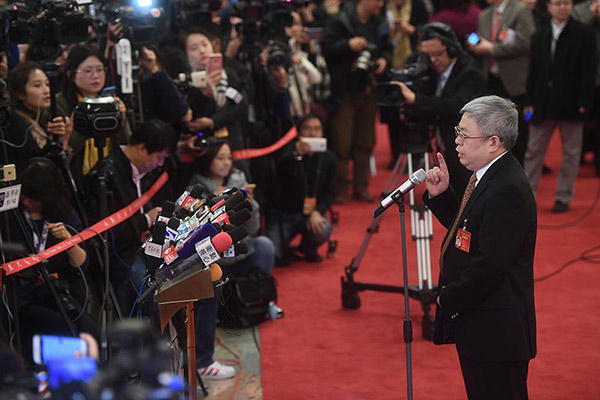
Liu Yongfu, head of the State Council Leading Group Office of Poverty Alleviation and Development, talks to media at “ministers’ passage” in Beijing, March 5, 2017. [Photo/Xinhua]
Counties no longer in poverty can still benefit from favorable policies
“Impoverished counties” can still benefit from poverty-alleviation policies for a certain period after they have been lifted out poverty, Liu Yongfu, head of the State Council Leading Group Office of Poverty Alleviation and Development, said on March 5.
Extending favorable polices for these counties can help boost their development and prevent them from falling into poverty again, he said.
Some impoverished counties are reluctant to be graded as having been lifted out poverty by the Central government for fear they may lose favorable poverty-alienation policies, according to some media reports.
China has pledged to pull all people out of poverty by the end of 2020.
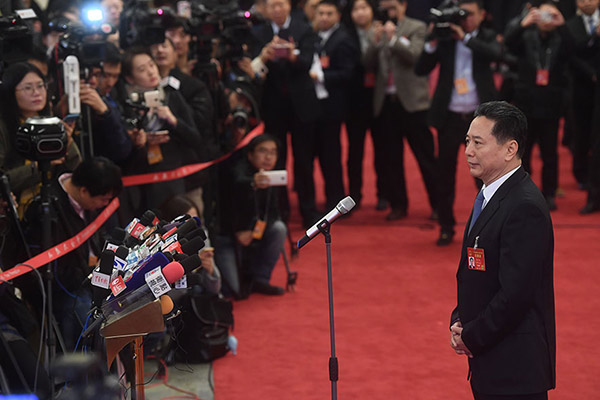
Transport Minister Li Xiaopeng talks to media at “ministers’ passage” in Beijing, March 5, 2017. [Photo/Xinhua]
Research must be conducted before congestion charges
Local authorities should conduct thorough research and foster maximum consensus in society before launching a congestion charge to reduce traffic gridlock, Transport Minister Li Xiaopeng said on March 5.
The minister told reporters before the opening of the National People’s Congress that congestion charges can only be launched after thorough research and evaluation, and its implementation must be in line with the law.
Li said the ministry will encourage and support the development of bicycle-sharing services.
“We also encourage the local authorities to implement the strategy based on their cities’ situation and step up regulation,” he said.
He noted that it is also important for bicycle-sharing operators to improve their services and users to obey social protocol.
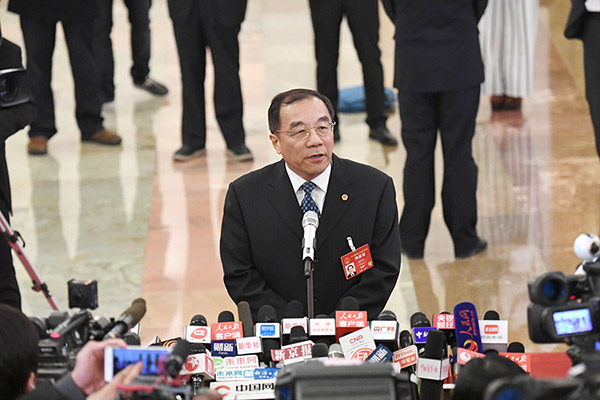
Yang Xiaodu, minister of supervision, talks to media at “ministers’ passage” in Beijing, March 5, 2017. [Photo/Xinhua]
Govt to curb red tape, extravagance
The government will increase efforts to curb extravagance and bureaucracy this year, and will push forward the pilot program of establishing supervisory commissions in Beijing, Shanxi and Zhejiang province, said Yang Xiaodu, minister of supervision, on March 5.
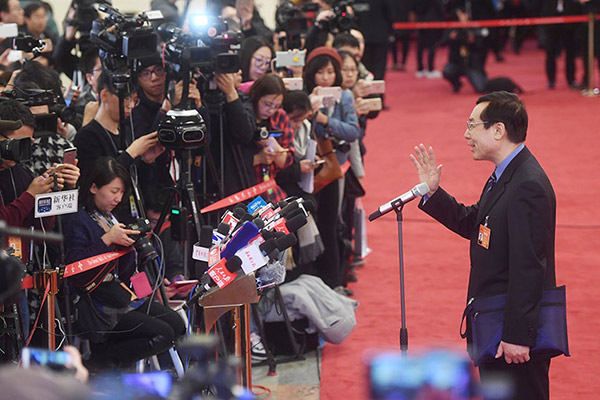
Bi Jingquan, chief of China Food and Drug Administration (CFDA), talks to media at “ministers’ passage” in Beijing, March 5, 2017. [Photo/Xinhua]
New measures planned to open pharmaceutical sector
China has big market potential for drugs and hopes more foreign pharmaceutical companies will tap the domestic market, Bi Jingquan, chief of China Food and Drug Administration (CFDA), said on March 5.
CFDA will take measures such as streamlining approval procedures for new drugs so that more new medicines are available in the market, he added.
